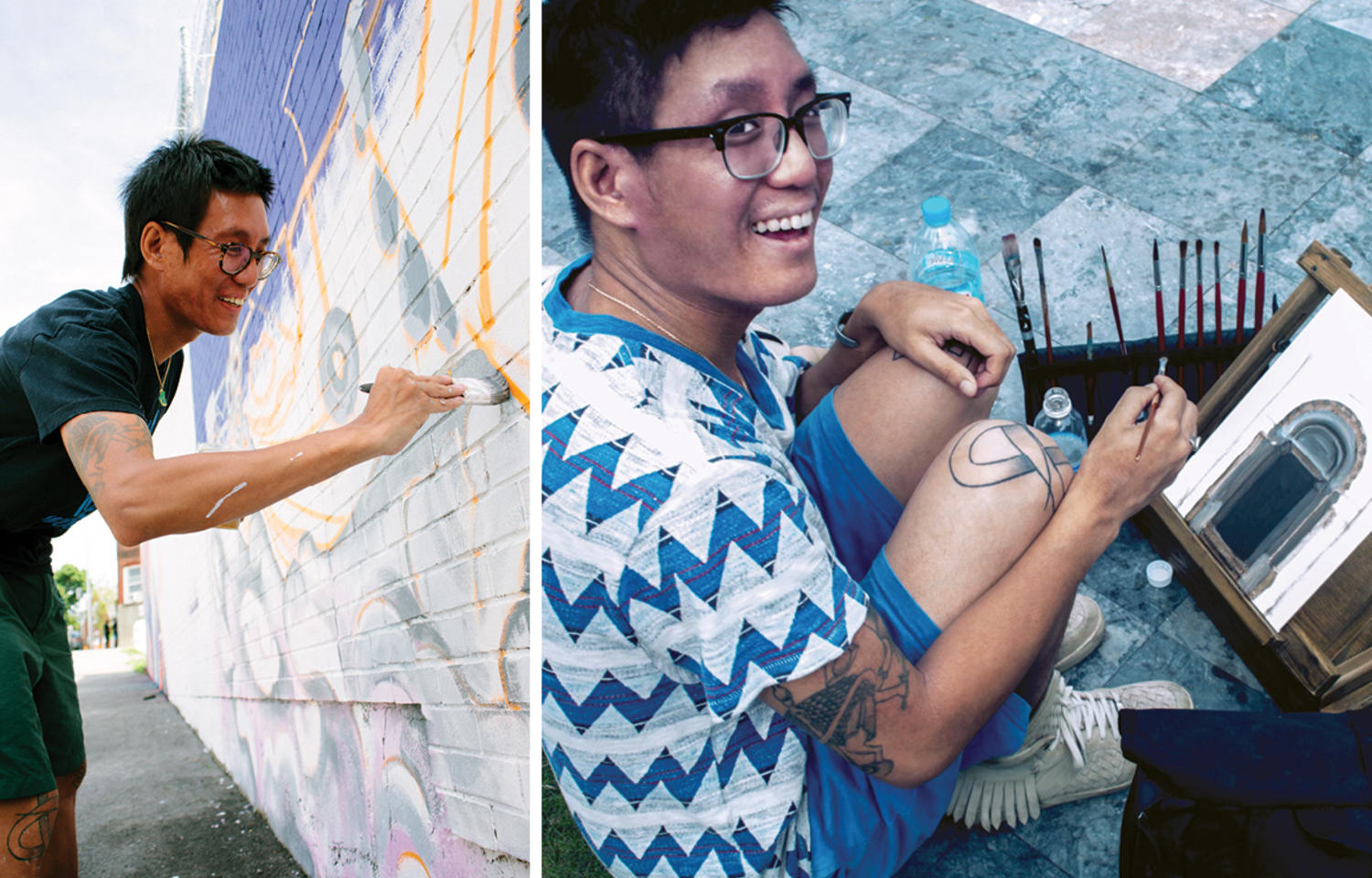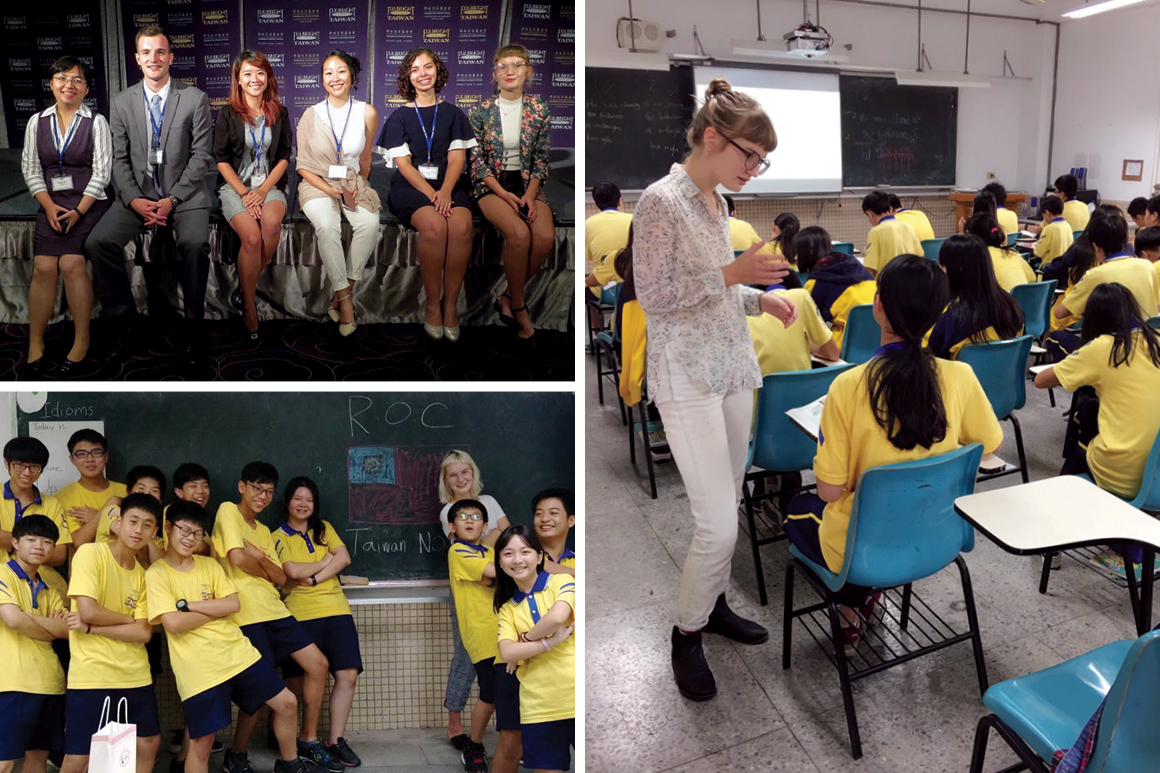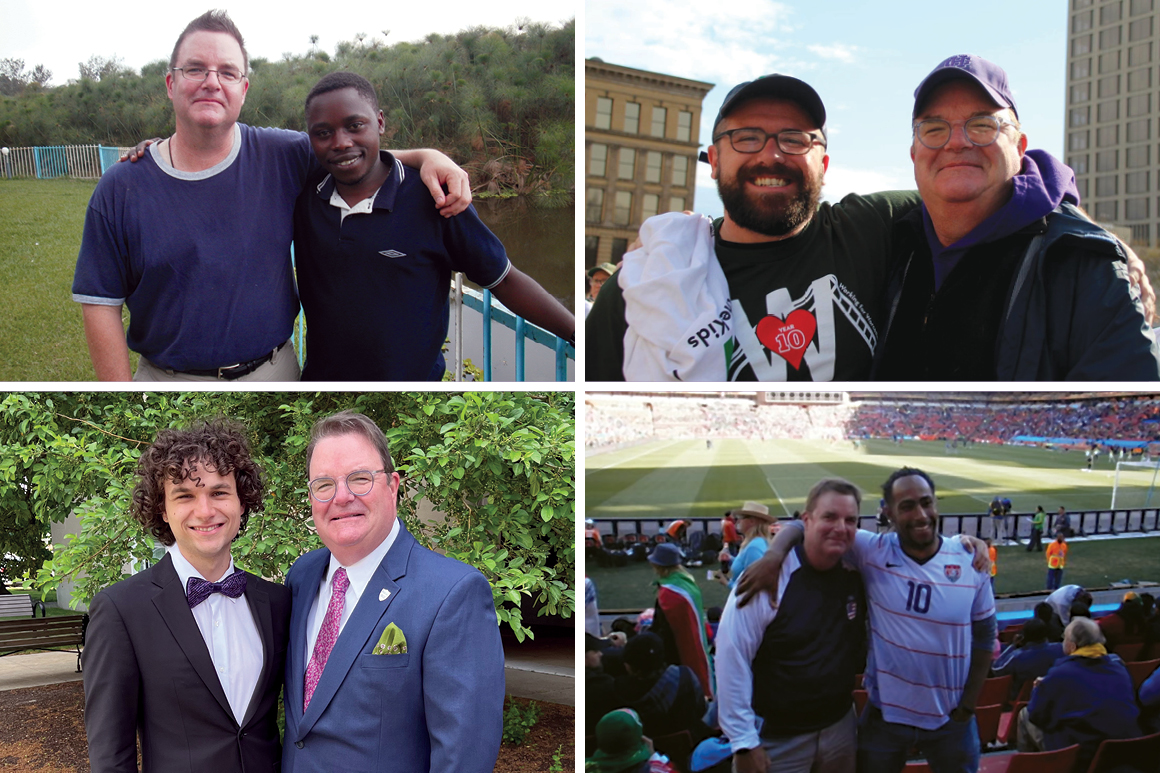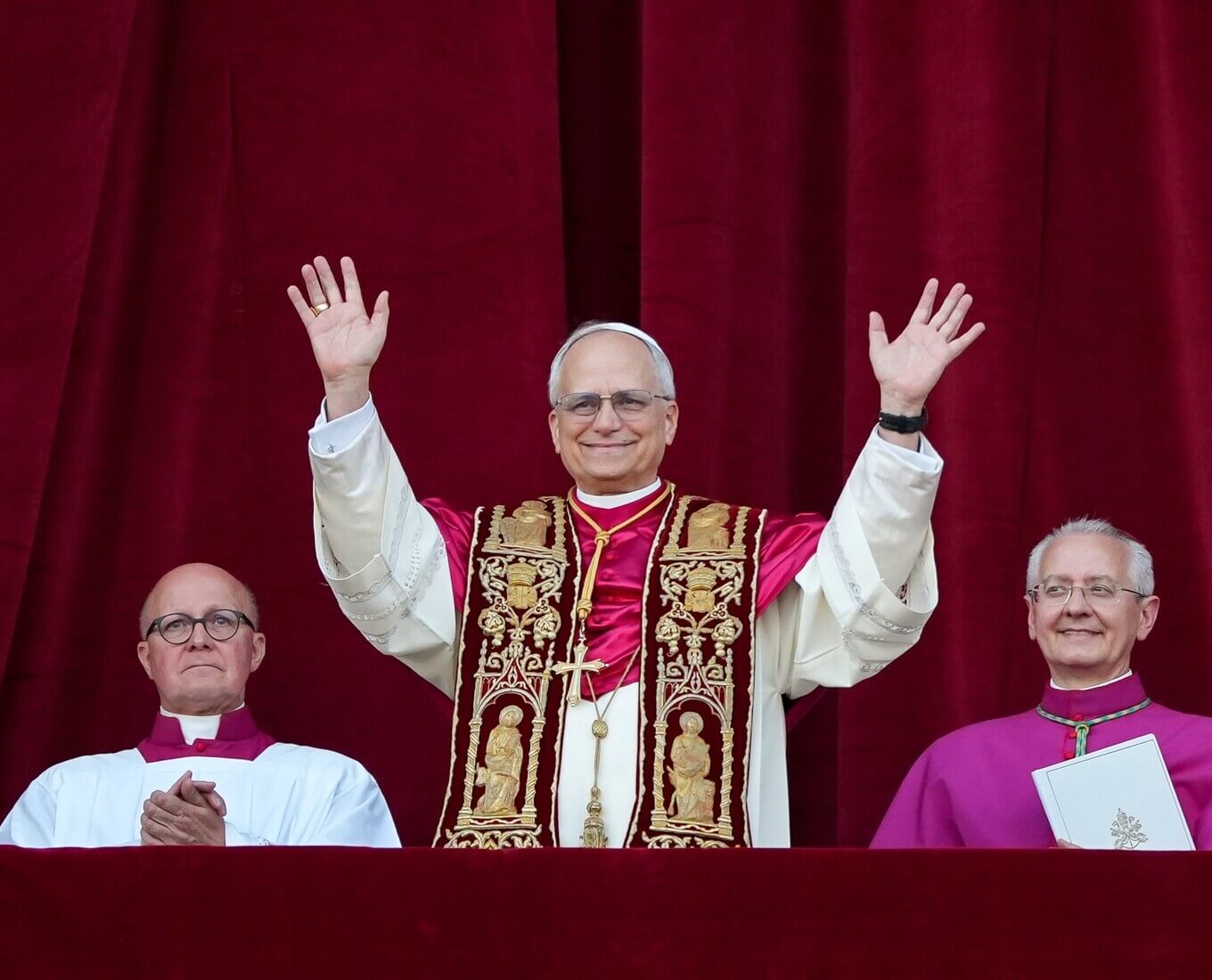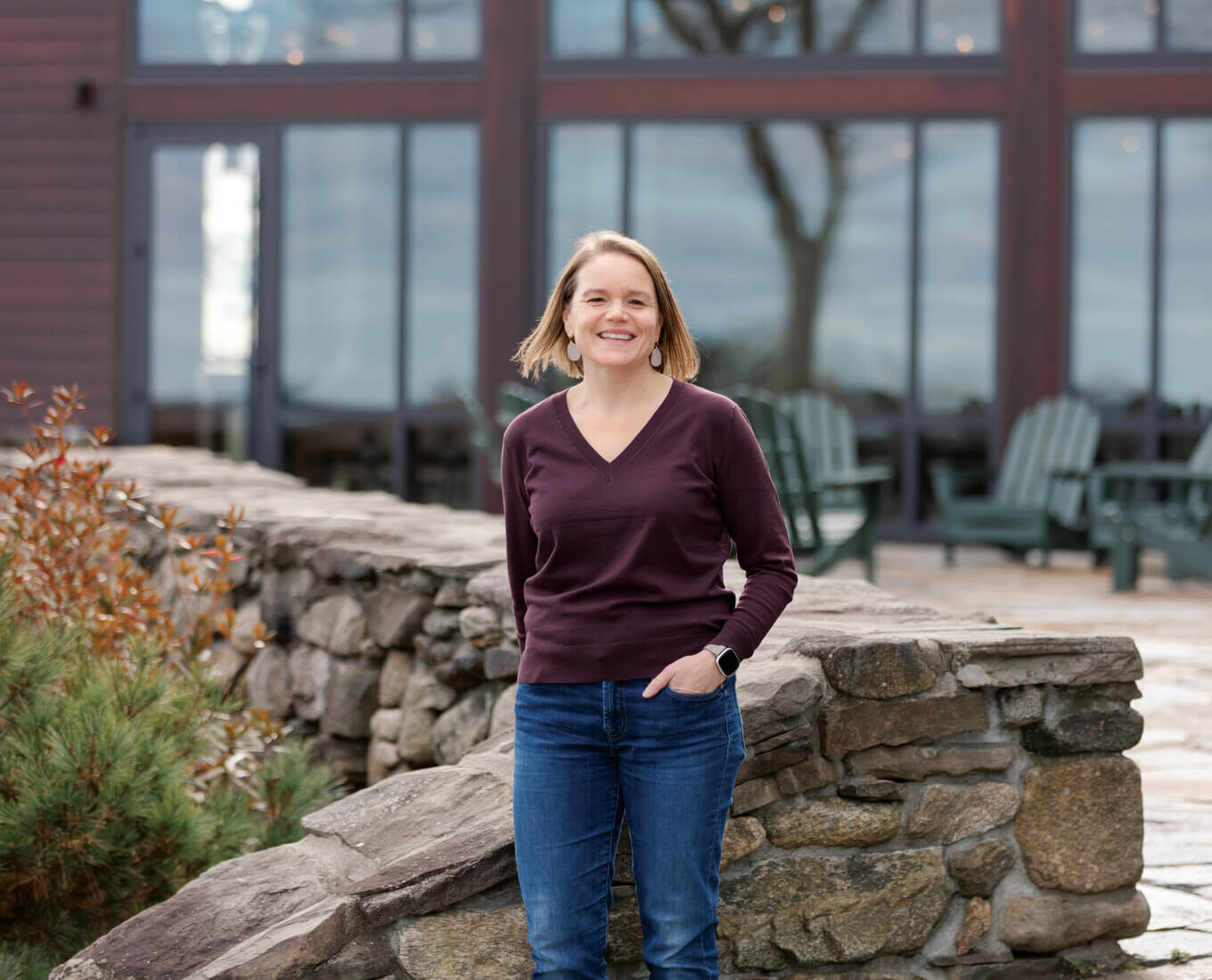Tucked within the offices on the third floor of Smith Hall, a silk painting hangs in Room 333. Rising from floor to ceiling, it covers most of the wall and depicts a woman standing in a small boat, her hands united in prayer as she observes a green vase emitting smoke. The artist, John Vo '09, drew inspiration from his Vietnamese heritage.
The work — and Vo's pursuit of examining his roots — would not have been possible without Holy Cross' decade-plus of success providing elite postgraduate opportunities for its students. For the past 13 years, the College's Office of Distinguished Fellowships and Graduate Studies, under the leadership of Director Anthony "Tony" Cashman, has assisted and mentored students like Vo in achieving prestigious, and often life-changing, post-grad experiences.
Vo’s painting now hangs in Cashman’s office acting not only as a reminder of the College's success, but also the influence it can have on the trajectory of a Fulbright's journey.
"I went to do silk painting and I'm still doing that today," Vo says."It's been my bread and butter in a lot of ways. Because of the [Fulbright Program], I couldn't even imagine where my life would be if I didn't take that route."
Since 2009, the office has produced 107 Fulbright Scholars, consistently ranking Holy Cross among the top undergraduate institutions nationally in the number of its students named to the prestigious international exchange program. In partnership with more than 140 countries worldwide, the Fulbright Program offers graduating college seniors, graduate students and young professionals from all disciplines an opportunity to pursue further study and research or teach English abroad.
"I'm very thankful for the program," Vo says."It gave me a level of self-awareness that I don't think would have been possible. Tony was very much a part of that. I don't think I had the confidence in going for it. His energy was just so there. I didn't know my own voice. He saw something that I didn't see."
Making the impossible possible
For Vo, living abroad in Vietnam appeared to be an idea that would always be out of reach. His parents were refugees of the country who came to the U.S. during the Vietnam War. They never wanted their son to visit their homeland, painting a picture of war, propaganda and paranoia.
Growing up, Vo accepted this image and never had the desire to visit, but then he began speaking to other children whose parents fled Vietnam. "I thought that maybe I could find something for myself there," Vo says. "So art being the thing that I really love, I thought, what better way to experience the culture than [through] something that's really familiar to me?"
He entertained the possibility of a trip to Vietnam through a Fulbright scholarship, but felt the qualifications exceeded his grasp. "To be honest, I thought it was so far out of my reach," Vo says. "A friend of mine, Olivia Vo, earned a Fulbright; she's amazing. I was, like, 'I'm not anything like her. I could never get this.' But Tony reassured me that I should just go for it. You have to play to win."
Vo applied and was accepted, forever altering his life's journey, personally and professionally. He remains the only research-based artist to be accepted into the Fulbright from Holy Cross since Cashman began leading the office.
During his time in his parents' native country, Vo learned their Vietnamese dialect was mainly used by older generations. He met much of his family for the first time, including a cousin also studying art at a university in Ho Chi Minh City.
He also traveled – a six-hour bus ride followed by a three-hour ferry – to his parents' hometown, a small city in the southwestern part of the country near Cambodia. He arrived in the early-morning hours, the glow from small stringed tree lights providing the only light, one that revealed the outline of buildings and other structures.
"At that time, I was, like, 'I'm going to eat this up because it will never be like this again,'" he says. During his time in the city, he visited the graves of his grandparents and other relatives, which were integrated into the family's rice fields. "You can very much feel the work and time the generations have put into the land," he says.
Three years after his experience in Vietnam, Vo brought his twin brother to the same spot. The route to the destination had changed and the scene he witnessed was gone, the city now sporting bright lights and paved roads. But Vo continues to reflect on his original visit and has started work on a graphic novel to share his journey with others.
"I would not have thought about going to Vietnam without the [Fulbright] program," Vo says. "I have an older brother and a twin brother. They never thought about going back until I went back."
"It changed me"
Beyond research-based fellowships, Fulbright Scholars can also live abroad while teaching English in their respective countries.
Lydia Grek '16, a Chinese major, spent two years teaching English in Taiwan after graduating from Holy Cross. She comes from a family of Holy Cross Fulbright Scholars: Her father, Predrag Cicovacki, Holy Cross professor of philosophy, won a faculty Fulbright Scholar grant to study in India several years ago, and her sister, Heidi Grek '10, taught English in Germany as a Fulbright Scholar.
But it wasn't until she studied abroad in Beijing and Shanghai that Grek began considering the Fulbright program for herself: "It was experiencing that life abroad, not only how much language enrichment you can get, but also personal enrichment. It showed me there was a path forward with international affairs, speaking Chinese. I didn't know anyone else who had gone this path. It was really helpful to have people like that around me."
Fewer than five years after her Fulbright experience, Grek is a China policy analyst for RAND Corporation, frequently working with the U.S. Department of Defense providing recommendations on navigating rising conflicts in East Asia.
"At Holy Cross, I had no idea that these fields even existed," says Grek, who credits Cashman for helping her pursue her Fulbright — but his help didn't end there. Following her two years in Taiwan, Grek applied for a Princeton Asia Fellowship. One evening after a conference in Taipei, Grek received a call from Cashman to help her organize her thoughts and application. For an hour, as Grek sat in a dark hallway of the conference center, the two organized a strategy.
"He had everything to be doing, I'm sure, for his job. But he took the time to talk to me," she says."We talked for a good hour. He was looking at my application; this was long after I graduated. He did not need to do that. He's just always been really, really supportive."
Like Grek, Malik Neal '13 pursued a Fulbright to continue the work he began in Sri Lanka as a Holy Cross study abroad student. (In January 2022, the College was ranked No. 1 among baccalaureate institutions in the U.S. for long-term, study abroad programs — the 13th consecutive year that Holy Cross has held one of the top three positions on the list.)
Neal's research was based on speaking with youth and others in Sri Lanka who fought in the country's civil war: "It changed me, personally, it made me appreciate more than any other experience I've had, just the complexity of human beings. I did a lot of interviews and research with people who had, in the past, done some horrible things. I was pushed in ways I had never been to still see the humanity in that person. I think that had a profound impact on me."
Reflecting on his time in Sri Lanka from 2013-2014, Neal can see how his research affected his path when he returned. In 2017, he co-founded the Philadelphia Bail Fund, a nonprofit that provides support to low-income, incarcerated individuals and works to end the injustice of wealth-based detention.
"As I look back on it, the work I was doing in Sri Lanka, trying to understand how a country emerging from a civil war with a long history of racial strife, how it repairs itself both collectively and individually, my current work at home — about 9,000 miles from Sri Lanka — in some ways is the same quest," Neal says."I'm trying to reckon with America's legacy of slavery, Jim Crow, mass incarceration and trying to understand and really bring into reality a better society for all."
It's a journey that Neal wasn't confident was possible before meeting with Cashman. "For me, what was most helpful — and I think this is what might be most important — is there are a lot of students who have potential, but for a lot of them, that potential is only realized or begins to be realized when you have someone who believes in you," Neal says. "I think Tony was that for me."
"I don't know if there is anything more satisfying"
Tony Cashman's route to Holy Cross wasn't a conventional one.
While studying Italian Renaissance history at Duke University, Cashman used his Fulbright fellowship to conduct his dissertation research in Mantua, Italy, as part of his path to earning a Ph.D. in history.
When he returned to the U.S., he envisioned becoming a professor and did. He spent two years at Valparaiso University teaching general humanities, then taught history for two years at Holy Cross and another year at Assumption College, before continuing his professorial work at Harvard University in the expository writing program. While Cashman lived out his career aspirations, the idea of calling a single campus home became attractive, specifically Holy Cross.
His wife, Stephani Yuhl, was a member of the College's history department and today is W. Arthur Garrity, Sr. Professor in Human Nature, Ethics and Society.
When the director position opened within the Office of Distinguished Fellowships and Graduate Studies, Cashman took a shot and hasn't looked back.
"I don't know if there is anything more satisfying than changing the trajectory of someone's life. That's the kind of thing that all educators dream of doing. It's the purpose," Cashman says. "Teaching is fantastic and teachers alter people's lives all the time. I just find, for me, I'm more effective in this setting. I think I've had a better effect on my students whom I advise than the students I taught."
Cashman took on his new role already well versed in what post-graduate fellowships could mean for students. The 15 months he spent in Italy, he says, are nearly incomparable to any other portion of his life.
"For me, the Fulbright was a life-changing experience, going and living in a place full time," Cashman says. "The way that my worldview changed and the way that I understood myself in relationship to a lot of things, in particular to our own country; you see your own country through other people's eyes. You see the way that other people think of things."
Cashman still reminisces about the 60 minutes each evening that's ingrained in Italian culture, in which people stop their day-to-day activities to enjoy community on the piazza. "Taking time to do that kind of thing is just not really American," Cashman says. "It was something I guess I knew existed, but I just didn't think about it. It's just one example of the illuminating differences you encounter when traveling abroad."
Worldwide victories
While Cashman remains in Worcester, the branches of his mentor tree extend across the country not only with alumni, but also now with peers.
Ben Rayder '09 came to Cashman following his study abroad semester and with just weeks to apply for a Fulbright fellowship. Cashman guided him on how to turn around an application in time.
The two remained in contact during Rayder's ensuing Fulbright in Germany and have become friends, an experience that prompted Rayder to pursue a career helping others become Fulbright Scholars. Today, he serves as director of the Office of Undergraduate Research and Major Awards at the University of Houston.
"In some ways, it's kind of life coming full circle. I'm doing the job that he did for me as a student," Rayder says. "He's mentored me throughout; he's never really stopped."
Similar to Cashman's impact at Holy Cross, under Rayder's guidance, post-graduate fellowships have skyrocketed at Houston. Before his arrival in 2017, the university produced 35 Fulbright Scholars over the previous 50 years. In the five years since Rayder arrived, the school has generated 46 and twice in the past three years has also been named one of the nation's top producers of Fulbright Scholars. Two years ago, a Houston graduate was also named a Truman Scholar, a premier graduate fellowship for public service leadership, only the second time a Houston student received the honor and the first in nearly 40 years.
"When I have victories, I guess you could call them, I really see them as Tony's, as well. A lot of what I learned, I learned from him," Rayder says. "A lot of his knowledge has been transferred to me. It's almost like he's winning at two different schools."
Serving others
Cashman's inbox often fills with photos from Fulbright Scholars donning a Holy Cross T-shirt surrounded by students in faraway classrooms. The images hint at life-altering connections built worldwide between the scholars and their students.
"I think our students tend to be really good people, who are out there to serve others in the world," Cashman says. "And showing other people that this is who we are, I think is fantastic."
As Cashman sits in his office in Smith Hall, he reflects on all the connections and relationships that began at his desk due to the Fulbright Program. He leans back in his chair and smiles: "In a sense, it's almost like I'm getting to help others have an experience, the experience that was probably the most important in my life. That's a cool thing. The combination of the international program's opportunities and Holy Cross mentorship deliver life-changing experiences is a really cool thing."
